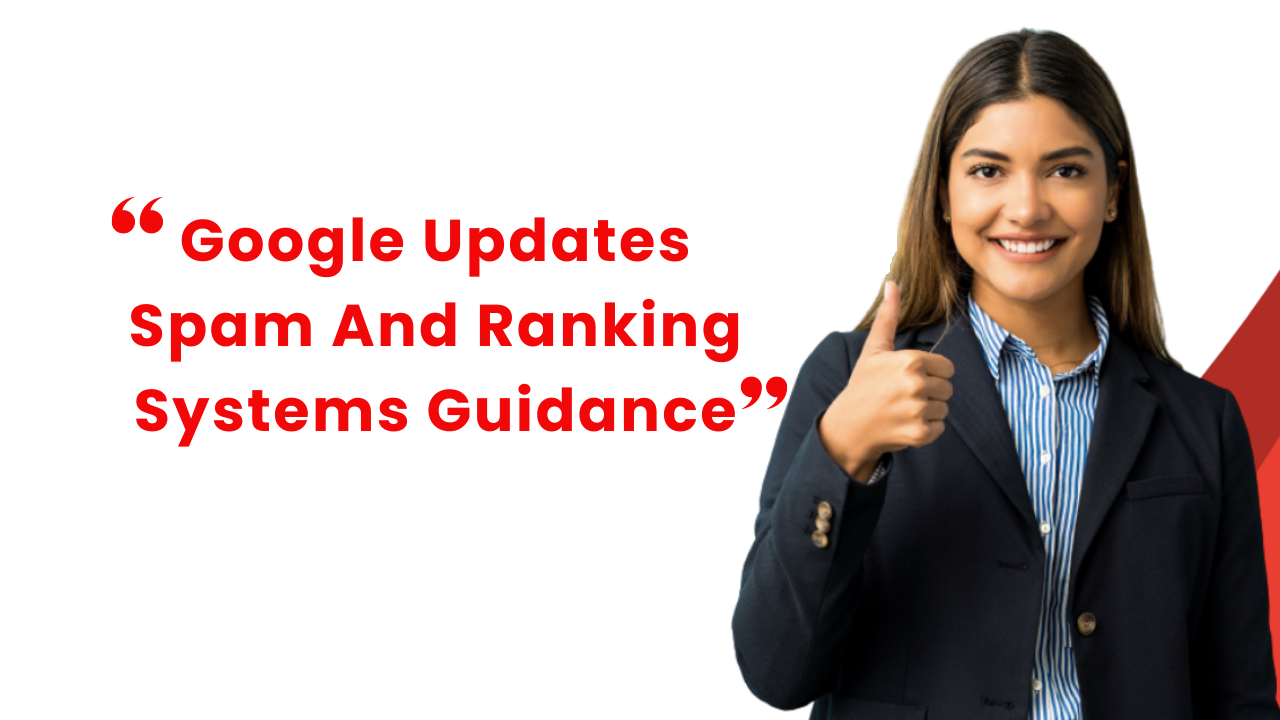Staying abreast of Google’s continuous updates in the ever-evolving online search landscape is paramount for businesses and website owners. The latest focus centers on Google’s relentless efforts to refine its spam detection and ranking systems. In our blog, “Google Updates Spam And Ranking Systems Guidance,” we delve into the intricacies of these pivotal changes, unravelling the mystery behind Google’s algorithmic advancements.
As the digital realm becomes more sophisticated, Google strives to ensure a fair and user-centric online experience. Our exploration will guide you through the nuances of these updates, shedding light on how they impact website rankings and visibility. From understanding the intricacies of spam detection to deciphering the criteria influencing page rankings, our blog aims to demystify the latest guidance from Google.
Join us on a journey through the digital intricacies as we unravel the significance of Google’s updates. Arm yourself with insights to adapt your online strategy, aligning with the ever-shifting algorithms that shape the digital landscape. Stay informed, stay competitive, and let’s navigate the dynamic world of Google’s spam and ranking systems together.
Understanding Google’s Spam Detection Mechanisms
Google’s spam detection relies on advanced machine learning algorithms to scrutinize patterns and identify potential spam. Content quality, relevance, and link analysis play pivotal roles. Understanding these mechanisms is crucial for maintaining a positive online presence and ensuring websites align with Google’s guidelines.
Google employs sophisticated mechanisms to detect and combat spam on its platform. Some key points to consider include:
Machine Learning Algorithms: Google utilizes advanced machine learning algorithms to analyze patterns and identify potentially spammy content.
Content Quality Evaluation: The search giant assesses the quality of content by considering factors such as relevance, uniqueness, and user engagement. Link Analysis: Google examines the link profile of websites to detect unnatural link-building practices, a common tactic spammers use.
Link Analysis: Google examines the link profile of websites to detect unnatural link-building practices, a common tactic used by spammers.
Critical Elements of Google’s Ranking Systems
Unlocking higher search rankings on Google involves mastering critical elements of its ranking systems. Prioritize content relevance, optimize for swift page loads, and ensure mobile-friendliness. Understand and adapt to Google’s ever-evolving algorithms, including recent updates like BERT and Core Web Vitals. Stay ahead by creating valuable content aligned with user intent.
To enhance your website’s visibility, it’s essential to understand the factors influencing Google’s ranking systems. Key elements include:Relevance of Content: Google prioritizes content that is relevant to user queries. Ensuring your content aligns with user intent is crucial for higher rankings.
Page Load Speed: The speed at which your pages load can impact rankings. Optimize your website for quick loading times to enhance user experience.
Mobile-Friendliness: With the increasing use of mobile devices, Google favors websites that are mobile-friendly. Ensure your site is responsive to different screen sizes.
Recent Google Algorithm Updates
Recent Google algorithm updates like BERT and Core Web Vitals have reshaped the digital landscape. BERT enhances understanding of search context, while Core Web Vitals prioritize user experience metrics. Staying informed about these changes is crucial for businesses seeking to optimize their online presence and maintain search visibility.
Staying current with Google’s algorithm updates is essential for adapting your strategy to meet new criteria. Recent noteworthy updates include:
Bert Algorithm: Introduced to better understand the context of words in search queries, the BERT algorithm has influenced how Google interprets and ranks content.
Core Web Vitals: Google now considers user experience metrics like page loading, interactivity, and visual stability as ranking factors, emphasizing the importance of a seamless user experience.
Best Practices for Staying Compliant with Google Guidelines
Ensuring compliance with Google guidelines is paramount for online success. Adopt best practices by focusing on quality content creation, conducting regular SEO audits, and employing ethical link-building strategies. By staying aligned with Google’s standards, you improve search rankings and build a trustworthy and enduring online presence. To maintain a positive online presence, adhere to Google’s guidelines with these best practices:
Quality Content Creation: Focus on creating high-quality, valuable content that meets user needs. This not only enhances your rankings but also engages your audience.
Regular SEO Audits: Conduct regular website audits to identify and rectify issues impacting its performance and compliance with Google’s guidelines.
Ethical Link Building: Instead of engaging in manipulative link-building practices, focus on earning quality backlinks through valuable content and collaborations.
Navigating Google Penalties: What You Need to Know
Navigating Google Penalties requires vigilance and swift action. Regularly monitor your website’s performance to identify potential penalties. If penalized, promptly rectify issues, such as cleaning up spammy content and disavowing harmful links. Stay informed about Google’s guidelines and algorithm updates to adjust your strategy and maintain a positive online presence proactively. Despite best efforts, websites may incur penalties. Here’s what you need to know:
- Identifying Penalties: Monitor your website’s performance and search visibility regularly to identify any sudden drops which may indicate a penalty.
- Recovery Strategies: If penalized, take immediate action to rectify the issues. This may involve cleaning up spammy content, disavowing harmful links, and submitting a reconsideration request.
- Preventive Measures: Implement preventive measures to minimize the risk of penalties. Stay informed about Google’s guidelines and algorithm updates to adjust your strategy proactively.
FAQs
Why is Google updating its spam detection system?
Google updates its spam detection system to combat evolving tactics employed by spammers, ensuring the reliability and integrity of search results. By staying ahead of deceptive practices, Google aims to provide users with accurate, relevant, and trustworthy information, enhancing the overall user experience.
How do the recent updates impact website rankings?
Recent updates to Google’s ranking systems influence website rankings by considering various factors such as content quality, relevance, and adherence to guidelines. Understanding and adapting to these changes is crucial for maintaining or improving a website’s visibility in search results.
What criteria does Google consider in its ranking algorithm?
Google’s ranking algorithm takes into account numerous criteria, including content relevance, quality, user experience, page loading speed, mobile-friendliness, and adherence to ethical SEO practices. Websites that align with these criteria are more likely to achieve higher rankings.
How can website owners adapt to the latest guidance from Google?
Website owners can adapt to Google’s latest guidance by focusing on high-quality content, ensuring a positive user experience, and staying informed about algorithm updates. Implementing ethical SEO practices and addressing technical aspects can help align a website with Google’s evolving standards.
What are the potential consequences of non-compliance with Google’s guidelines?
Non-compliance with Google’s guidelines can lead to penalties, decreased visibility in search results, and a compromised online reputation. Websites that engage in manipulative or deceptive practices risk facing consequences that may negatively impact their overall performance and trustworthiness.
Conclusion
In conclusion, navigating the digital landscape requires a keen understanding of Google’s dynamic updates to spam detection and ranking systems. As we’ve explored the intricacies of these changes, it becomes evident that staying informed is not just a strategy but a necessity. Adapting to Google’s evolving guidance empowers website owners to optimize their online presence, ensuring relevance and trustworthiness. In this ever-changing terrain, knowledge is the key to resilience. By embracing the insights shared in this blog, businesses and individuals alike can not only navigate the currents of algorithmic shifts but also thrive in the competitive realm of online visibility. Stay informed, stay adaptive, and let your digital presence flourish.





